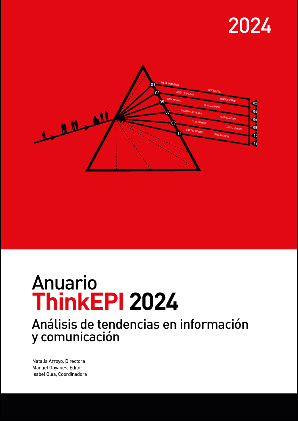Todos los caminos llevan a Roma: propiedad intelectual, inteligencia artificial y medios de comunicación
DOI:
https://doi.org/10.3145/thinkepi.2024.e18a15Palabras clave:
Propiedad intelectual, Derecho de autor, Inteligencia artificial, Directiva Europea sobre IAResumen
La irrupción de la inteligencia artificial, aunque no es nueva y se lleva aplicando en las redacciones de los medios al menos desde 2014, ha experimentado un gran crecimiento desde la comercialización de sistemas como ChatGPT, a partir de finales de 2022. Este incremento en la producción de contenidos y entrenamiento de sistemas de inteligencia artificial mediante el uso masivo de datos ajenos ha provocado que se hayan planteado cuestiones muy serias acerca de hasta qué punto la actual legislación de propiedad intelectual será capaz de dar respuesta a los nuevos retos. Los medios, y en menor medida los profesionales, han usado tres instrumentos legales para hacer frente a esos desafíos: la reforma de las leyes, y la aprobación de una Directiva Europea sobre inteligencia artificial; acudir a los tribunales; y negociar con las grandes compañías involucradas en el desarrollo de sistemas de inteligencia artificial, como OpenAI.Descargas
Citas
Caswell, David (2024). How media managers think AI might transform the news ecosystem. Oxford: Reuters Institute for the Study of Journalism. https://reutersinstitute.politics.ox.ac.uk/news/how-media-managers-think-ai-might-transform-news-ecosystem
Dell’Acqua, Fabrizio; McFowland, Edward; Mollick, Ethan R.; Lifshitz-Assaf, Hila; Kellogg, Katherine; Rajendran, Saran; Krayer, Lisa; Candelon, François; Lakhani, Karim R. (2023). “Navigating the jagged technological frontier: Field experimental evidence of the effects of AI on knowledge worker productivity and quality”. Harvard business school technology & operations Mgt. Unit Working Paper No. 24-013. https://doi.org/10.2139/ssrn.4573321
Díaz-Noci, Javier (2024). Artificial intelligence, copyright law, other related legal aspects, and the digital news. Dublin: Centre for Digital Policy, University College Dublin. https://digitalpolicy.ie/wp-content/uploads/2024/05/AI-copyright-law-and-digital-news.pdf
Elondou, Tina; Manning, Sam; Mishkin, Pamela; Rock, Daniel (2023). “GPTs are GPTs: An early look at the labor market impact potential of Large Language Models”. Working paper. https://arxiv.org/pdf/2303.10130.pdf
Fernández-Carballo-Calero, P. (2022). 25 things you should know about artificial intelligence and copyright. Pamplona: Thomson Reuters-Aranzadi.
Fu, Angela (2023). “As AI enters newsrooms, unions push for worker protections”. St Petersburg Florida: Poynter Institute. https://www.poynter.org/business-work/2023/artificial-intelligence-writers-guild-unions-journalism-jobs
Gaon, Aviv H. (2021). The future of copyright in the age of artificial intelligence. Cheltenham: Edward Elgar. ISBN: 978 1 83910 314 8
Geige, Christophe; Vincenzo, Laia (2023). “Generative AI, digital constitutionalism and copyright: Towards a statutory remuneration right grounded in fundamental rights”. Kluwer Copyright Blog, October 19. https://copyrightblog.kluweriplaw.com/2023/10/19/generative-ai-digital-constitutionalism-and-copyright-towards-a-statutory-remuneration-right-grounded-in-fundamental-rights-part-2/#:~:text=In%20this%20case%2C%20where%20the,generated%20outputs%20and%20human%20creativity
Gervais, Daniel J. (2002). “Feist goes global: A comparative analysis of the notion of originality in copyright law”. Journal of the Copyright Society of the U.S.A. n. 49, pp. 949-981. https://ssrn.com/abstract=733603
Ginsburg, Jane C.; Budjardio, L. A. (2019). Authors and machines. Berkeley technology law journal, 34, pp. 343-456. https://doi.org/10.15779/Z38SF2MC24
Guadamuz, Andrés (2017). “Artificial intelligence and copyright”. WIPO Magazine. https://www.wipo.int/wipo_magazine/en/2017/05/article_0003.html
Hui, Xiang; Reshef, Oren; Zhou, Luofeng (2023). The short-term effects of generative artificial intelligence on employment: Evidence from an online labor market. https://doi.org/10.2139/ssrn.4527336
Krausová, Alžběta; Moravec, Václav (2022). “Disappearing authorship: Ethical protection of AI-generated news from the perspective of copyright and other laws”. JIPITEC, pp. 133-144. https://www.jipitec.eu/archive/issues/jipitec-13-2-2022/5540
Lee, Karen; Molitorisz, Sacha (2021). “The Australian News Media Bargaining Code: lessons for the UK, EU and beyond. Journal of media law, v. 13, n. 1, pp. 36-53. https://doi.org/10.1080/17577632.2021.1963585
Lombardi, Claudio (2023). “Rethinking journalism protection: looking beyond copyright”. Journal of media law, v. 15, n. 1, pp. 90-120. https://doi.org/10.1080/17577632.2023.2234691
Lu, Bingbin (2021). “A theory of ‘authorship transfer’ and its application to the context of Artificial Intelligence creations”. Queen Mary journal of intellectual property, v. 11, n.1, pp. 2–24. https://doi.org/10.4337/qmjip.2021.01.01
OMPI (2018). “Artificial intelligence and intellectual property: an interview with Francis Gurry”. WIPO Magazine. https://www.wipo.int/wipo_magazine/en/2018/05/article_0001.html
Senftleben, Martin (2023). “Generative AI and author remuneration”. International review of intellectual property and competition law, n. 54, pp. 1535-1560. httsp://doi.org/10.2139/ssrn.4478370
Trapova, Alina; Mezei, Peter (2021). Robojournalism – A copyright study on the use of artificial intelligence in the European news industry. GRUR international, v. 71, n. 7, pp. 589-602. https://doi/10.1093/grurint/ikac038
Vogler, Daniel; Eisenegger, Mark; Fürst, Silke; Udris, Linards; Ryffel, Quirin; Rivière, Maude; Schäfer, Mike S. (2023). Artificial intelligence in news production: perception and acceptance among the Swiss population. Zürich: Research Center for the Public Sphere and Society (fög) / University of Zurich.
Descargas
Publicado
Cómo citar
Dimensions


